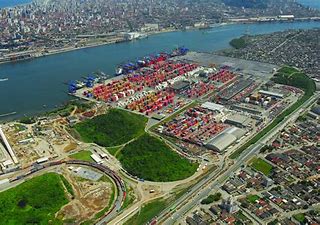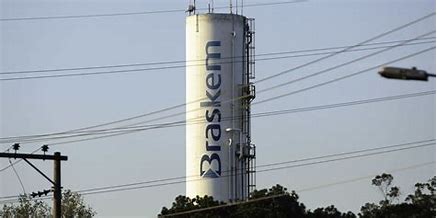Australian group Macquarie will inject R$500m and become a partner of CLI
07/18/2022

Rumo — the logistics company of the producer of bioethanol, sugar and energy Cosan —signed last Friday the contract for the sale of two terminals in the Port of Santos to CLI (Corredor Logística e Infraestrutura), a company controlled by IG4 Capital. The agreement is for R$1.4 billion. Eighty percent of the shares of the assets will be sold, and Rumo will continue as minority shareholder, with 20%.
The two terminals sold are T16 and T19, located on the right bank of the port and intended for grain and sugar handling. The lease contract for the two areas runs until 2035. The obligations of the concession also include investments of R$600 million to expand the handling capacity of the assets by 20%.
In 2021 (year affected by crop failure), the terminals transported 12.7 million tonnes. In the first quarter of 2022, 3 million tonnes were handled.
The conclusion of the operation still depends on the approval of the port regulator Antaq and the antitrust regulator CADE.
Today, CLI already operates a grain terminal in the Port of Itaqui, in Maranhão state. The “white flag” operator is one of the four controlling companies of the Maranhão Grain Terminal (Tegram) — the others are companies linked to commodity trading companies. “We want to bring the same efficiency gains that we implemented in Itaqui to Santos,” said the CEO, Helcio Tokeshi.
The operation also marks the ingress of Macquarie Asset Management in CLI. The Australian group will become a partner of IG4 Capital, with a 50% stake in the logistics operator. The entry will be made through a capital increase of R$500 million, which will be fully subscribed by the Macquarie Infrastructure Partners V (MIP V) fund.
Macquarie had already tried to make a large investment with IG4 in 2021, when they made an offer for Andrade Gutierrez’s share in CCR. The operation, however, did not develop.
“With this acquisition, CLI becomes the largest independent operator of port infrastructure and logistics for agribusiness in the country,” says Paulo Mattos, co-founder of IG4.
When asked about the possibility of new acquisitions, Mr. Tokeshi said that CLI “is interested in continuing to grow. According to a market source, the company is already negotiating with trading and logistics companies in other regions of the country to expand the platform.
For Rumo, the sale is a way to ensure the expansion of port terminals in Santos and, at the same time, to deleverage the company. The company will have, in the coming years, multimillion investment commitments in its railroads — such as those resulting from the renewal brought forward of the Paulista Railway, the concession of the North-South Railway and the new project to extend the North Railway, up to Lucas do Rio Verde (Mato Grosso state).
“We want to focus on the railroad. We have a very robust investment plan and using opportunities like this to deleverage the company is part of our strategy”, says Rafael Bergman, Rumo’s CFO and Investor Relations officer.
The shared terminal operation model has been a standard in the company. In the Norte-Sul railroad, for example, several terminals built along the railroad were built with partners. In the Port of Santos itself, Rumo has a minority stake in three other port terminals, which are not part of the operation with CLI: TXXXIX (grain terminal, with Caramuru), Termag (fertilizer terminal, with Bunge) and TGG (grain terminal, with Bunge and Amaggi).
*By Taís Hirata — São Paulo
Source: Valor International


/i.s3.glbimg.com/v1/AUTH_37554604729d4b2f9f3eb9ad8a691345/internal_photos/bs/2022/F/U/7TX49DRHmWdl3PCH44Gg/despegar-getty-images.png)
/i.s3.glbimg.com/v1/AUTH_37554604729d4b2f9f3eb9ad8a691345/internal_photos/bs/2022/G/i/H4PYH5RwOTly6K1XyCBw/fitch-credito-matt-lloyd-bloomberg.png)
/i.s3.glbimg.com/v1/AUTH_37554604729d4b2f9f3eb9ad8a691345/internal_photos/bs/2022/a/u/79ICyGTf6et2FYLF60lg/risco-brasil-silvia-zamboni-valor.png)

/i.s3.glbimg.com/v1/AUTH_37554604729d4b2f9f3eb9ad8a691345/internal_photos/bs/2021/l/i/Xs6a6lQLqLYZJJsN3OPg/image00009.jpeg)
/i.s3.glbimg.com/v1/AUTH_37554604729d4b2f9f3eb9ad8a691345/internal_photos/bs/2022/Y/r/UhvQEmQDinfpQgSZZaqA/ppps-fernando-martinho-valor.png)
/i.s3.glbimg.com/v1/AUTH_37554604729d4b2f9f3eb9ad8a691345/internal_photos/bs/2022/L/c/hlX1BGTsysHRRBvYsgiA/14leg-100-abre4-e1-img01.jpg)
/i.s3.glbimg.com/v1/AUTH_37554604729d4b2f9f3eb9ad8a691345/internal_photos/bs/2022/A/0/w7AfWjQpiKIU4AA5n1EQ/050722-20jive-20021.jpg)